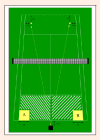The effect of moderate and high-intensity fatigue on groundstroke accuracy in expert and non-expert tennis players
- PMID: 24149809
- PMCID: PMC3761827
The effect of moderate and high-intensity fatigue on groundstroke accuracy in expert and non-expert tennis players
Abstract
Exploring the effects of fatigue on skilled performance in tennis presents a significant challenge to the researcher with respect to ecological validity. This study examined the effects of moderate and high-intensity fatigue on groundstroke accuracy in expert and non-expert tennis players. The research also explored whether the effects of fatigue are the same regardless of gender and player's achievement motivation characteristics. 13 expert (7 male, 6 female) and 17 non-expert (13 male, 4 female) tennis players participated in the study. Groundstroke accuracy was assessed using the modified Loughborough Tennis Skills Test. Fatigue was induced using the Loughborough Intermittent Tennis Test with moderate (70%) and high-intensities (90%) set as a percentage of peak heart rate (attained during a tennis-specific maximal hitting sprint test). Ratings of perceived exertion were used as an adjunct to the monitoring of heart rate. Achievement goal indicators for each player were assessed using the 2 x 2 Achievement Goals Questionnaire for Sport in an effort to examine if this personality characteristic provides insight into how players perform under moderate and high-intensity fatigue conditions. A series of mixed ANOVA's revealed significant fatigue effects on groundstroke accuracy regardless of expertise. The expert players however, maintained better groundstroke accuracy across all conditions compared to the novice players. Nevertheless, in both groups, performance following high-intensity fatigue deteriorated compared to performance at rest and performance while moderately fatigued. Groundstroke accuracy under moderate levels of fatigue was equivalent to that at rest. Fatigue effects were also similar regardless of gender. No fatigue by expertise, or fatigue by gender interactions were found. Fatigue effects were also equivalent regardless of player's achievement goal indicators. Future research is required to explore the effects of fatigue on performance in tennis using ecologically valid designs that mimic more closely the demands of match play. Key PointsGroundstroke accuracy under moderate-intensity fatigue is equivalent to performance at rest.Groundstroke accuracy declines significantly in both expert (40.3% decline) and non-expert (49.6%) tennis players following high-intensity fatigue.Expert players are more consistent, hit more accurate shots and fewer out shots across all fatigue intensities.The effects of fatigue on groundstroke accuracy are the same regardless of gender and player's achievement goal indicators.
Keywords: Fatigue; achievement motivation; expertise; tennis.
Figures







Similar articles
-
The impact of moderate and high intensity total body fatigue on passing accuracy in expert and novice basketball players.J Sports Sci Med. 2006 Jun 1;5(2):215-27. eCollection 2006. J Sports Sci Med. 2006. PMID: 24259994 Free PMC article.
-
Fatigue decreases skilled tennis performance.J Sports Sci. 2002 Apr;20(4):311-8. doi: 10.1080/026404102753576080. J Sports Sci. 2002. PMID: 12003276
-
Impact of mental fatigue on tennis players' attention and groundstroke performance.Front Psychol. 2025 May 2;16:1544785. doi: 10.3389/fpsyg.2025.1544785. eCollection 2025. Front Psychol. 2025. PMID: 40386674 Free PMC article.
-
Exercise-induced homeostatic perturbations provoked by singles tennis match play with reference to development of fatigue.Br J Sports Med. 2007 Nov;41(11):717-22; discussion 722. doi: 10.1136/bjsm.2007.037259. Br J Sports Med. 2007. PMID: 17957005 Free PMC article. Review.
-
Biomechanical analyses of different serve and groundstroke techniques in tennis: A systematic scoping review.PLoS One. 2023 Aug 17;18(8):e0290320. doi: 10.1371/journal.pone.0290320. eCollection 2023. PLoS One. 2023. PMID: 37590226 Free PMC article.
Cited by
-
Association between perceived exertion and executive functions with serve accuracy among male university tennis players: A pilot study.Front Psychol. 2023 Jan 25;14:1007928. doi: 10.3389/fpsyg.2023.1007928. eCollection 2023. Front Psychol. 2023. PMID: 36760452 Free PMC article.
-
Technical skills in complex tennis situations: Dutch talented players U15 compared to players U17.Front Sports Act Living. 2023 Mar 1;5:1107740. doi: 10.3389/fspor.2023.1107740. eCollection 2023. Front Sports Act Living. 2023. PMID: 36935885 Free PMC article.
-
Vibration-Damping technology in tennis racquets: Effects on vibration transfer to the arm, muscle fatigue and tennis performance.Sports Med Health Sci. 2019 Sep 10;1(1):49-58. doi: 10.1016/j.smhs.2019.09.001. eCollection 2019 Dec. Sports Med Health Sci. 2019. PMID: 35782465 Free PMC article.
-
Exercise-Induced Fatigue Impairs Change of Direction Performance and Serve Precision among Young Male Tennis Players.Sports (Basel). 2023 May 29;11(6):111. doi: 10.3390/sports11060111. Sports (Basel). 2023. PMID: 37368561 Free PMC article.
-
Acute and delayed effects of strength training in ball velocity and accuracy in young competition tennis players.PLoS One. 2021 Dec 9;16(12):e0260825. doi: 10.1371/journal.pone.0260825. eCollection 2021. PLoS One. 2021. PMID: 34882729 Free PMC article. Clinical Trial.
References
-
- Anshel M.H., Novak J. (1989) Effects of different intensities of fatigue on performing a sport skill requiring explosive muscular effort: A test of the specificity of practice principle. Perceptual and Motor Skills 69(2), 1379-1389 - PubMed
-
- Arnett M.G., DeLuccia D., Gilmartin K. (2000) Male and female differences and the specificity of fatigue on skill acquisition and transfer performance. Research Quarterly for Exercise and Sport 71 (2), 201-205 - PubMed
-
- Ash I.E. (1914) Fatigue and its effects upon control. Archives of Psychology 4, 1-61
-
- Aune T.K., Ingvaldse R.P., Ettem G.J.C. (2008) Effect of physical fatigue on motor control at different skill levels. Perceptual and Motor Skills 106 (2): 371-386 - PubMed
-
- Benjaminse A., Habu A., Sell T.C., Abt J.P., Fu F.H., Myers J.B., Lephart S.M. (2008) Fatigue alters lower extremity kinematics during a single-leg stop-jump task. Knee Surgery, Sports Traumatology, Arthroscopy 16, 400-407 - PubMed
LinkOut - more resources
Full Text Sources
